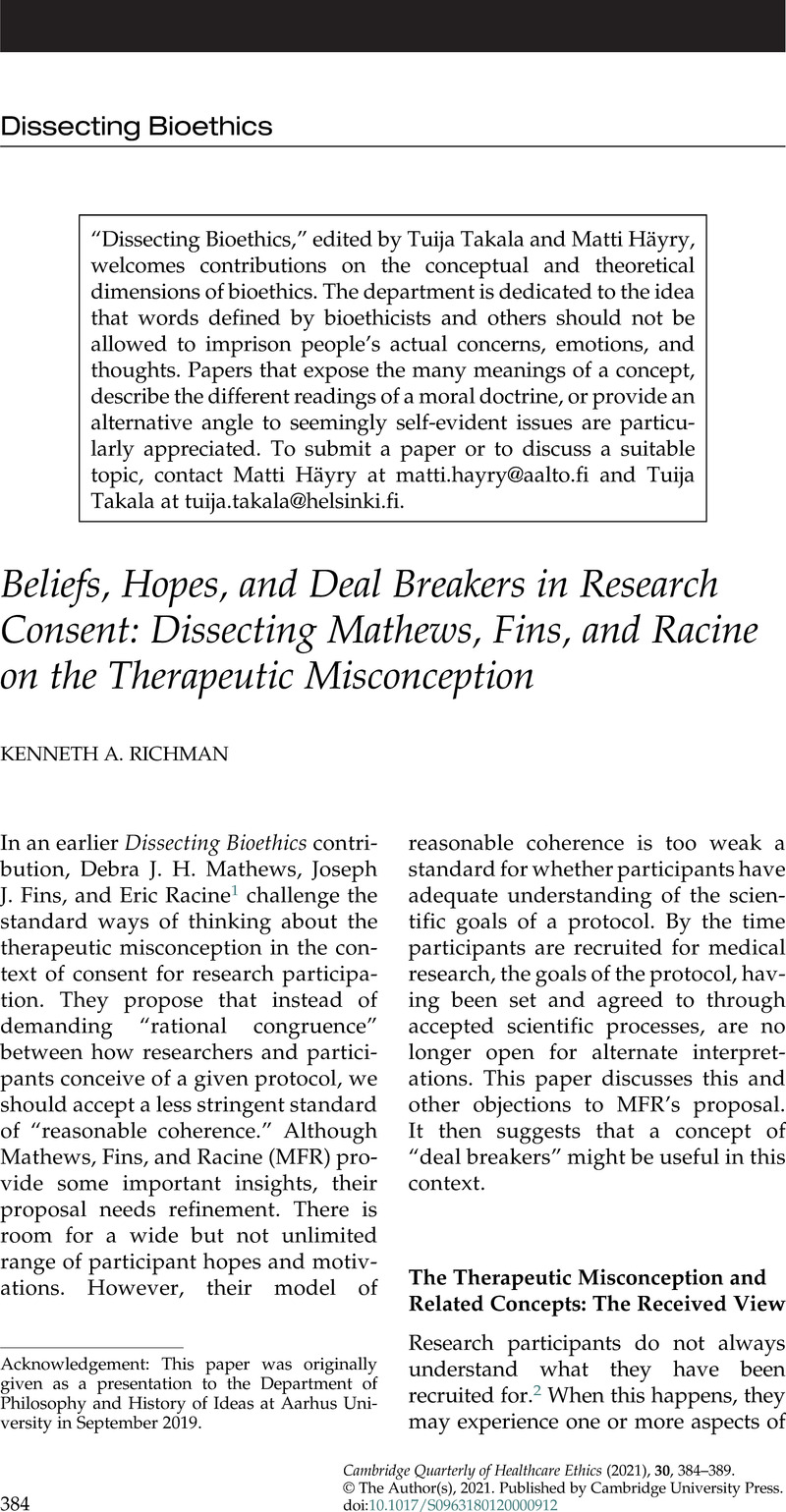No CrossRef data available.
Published online by Cambridge University Press: 25 March 2021

“Dissecting Bioethics,” edited by Tuija Takala and Matti Häyry, welcomes contributions on the conceptual and theoretical dimensions of bioethics. The department is dedicated to the idea that words defined by bioethicists and others should not be allowed to imprison people’s actual concerns, emotions, and thoughts. Papers that expose the many meanings of a concept, describe the different readings of a moral doctrine, or provide an alternative angle to seemingly self-evident issues are particularly appreciated. To submit a paper or to discuss a suitable topic, contact Matti Häyry at [email protected] and Tuija Takala at [email protected].
Acknowledgement: This paper was originally given as a presentation to the Department of Philosophy and History of Ideas at Aarhus University in September 2019.
1. Mathews, DJH, Fins, JJ, Racine, E. The therapeutic “mis”conception: An examination of its normative assumptions and a call for its revision. Cambridge Quarterly of Healthcare Ethics 2018;27(1):154–62.CrossRefGoogle Scholar
2. Miller, M. Phase I cancer trials: A collusion of misunderstanding. Hastings Center Report 2000;30(4):34–43.CrossRefGoogle ScholarPubMed
3. Horng, S, Grady, C. Misunderstanding in clinical research: Distinguishing therapeutic misconception, therapeutic misestimation, and therapeutic optimism. IRB: Ethics & Human Research 2003;25(1):11–6.CrossRefGoogle ScholarPubMed
4. See note 1, Mathews et al. 2018, at 155.
5. Cf. Appelbaum, PS, Roth, LH, Lidz, C. The therapeutic misconception: Informed consent in psychiatric research. International Journal of Law and Psychiatry 1982;5(3–4):319–29.CrossRefGoogle ScholarPubMed
6. Cf. Perry, J, Wohlke, S. Dealing with misconception in biomedical research. Journal of Empirical Research in Human Research Ethics 2019;14(5):428–32.CrossRefGoogle ScholarPubMed
7. See note 1, Mathews et al. 2018, at 156.
8. Jonas, H. Philosophical reflections on experimenting with human subjects. Daedalus 1969;98(2):236.Google Scholar
9. See note 1, Mathews et al. 2018, at 157.
10. See note 1, Mathews et al. 2018, at 156.
11. See note 1, Mathews et al. 2018, at 156.
12. See note 1, Mathews et al. 2018, at 156.
13. See note 1, Mathews et al. 2018, at 160.
14. See note 1, Mathews et al. 2018, at 160.
15. Cf. Fisher, CB, Wallace, SA. Through the community looking glass: Reevaluating the ethical and policy implications of research on adolescent risk and sociopathology. Ethics and Behavior 2000;10(2):99–118.CrossRefGoogle ScholarPubMed
16. Cf. Joffe, S, Weeks, JC. Views of American oncologists about the purposes of clinical trials. Journal of the National Cancer Institute 2002;94(24):1847–53.CrossRefGoogle ScholarPubMed
17. See note 1, Mathews et al. 2018, at 160.
18. See note 1, Mathews et al. 2018, at 155.
19. See note 3, Horng, Grady 2003, at 12.
20. See note 3, Horng, Grady 2003, at 12 (emphasis theirs).
21. Dougherty, T. Sex, lies, and consent. Ethics 2013;123(4):719.CrossRefGoogle Scholar
22. See note 21, Dougherty 2013, at 740.